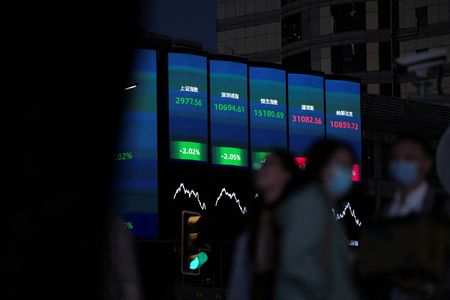By Summer Zhen
HONG KONG (Reuters) – A turbulent stock market and easy monetary conditions have made bond funds in mainland China the most preferred investment this year, and possibly the best-performing asset in the region.
Chinese public bond funds’ total assets under management (AUM) grew 27% from January to September to a record high of 5.19 trillion yuan ($717.07 billion), data from the Asset Management Association of China (AMAC) showed. That was the fastest growth among the five asset classes tracked by AMAC.
Shanghai-based Colight Asset Management, one of the largest private bond funds in mainland China, saw its AUM expand by about 60% this year, reaching 20 billion yuan.
Falling domestic interest rates and anxiety about economic growth have driven local investors into China’s relatively stable bond markets, fund managers said, with the bearishness on stock prices and earnings exacerbating the trend.
“I have to say it’s the poor performance of other assets that makes bond funds stand out,” said Jianqiao Feng, general manager of Colight Asset Management.
Seeking to make the most of this trend, Blackrock Inc <BLK.N> launched its first bond-oriented fund in China on Nov. 1. The fund invests primarily in fixed income, with a less than 30% equity exposure.
China has been an outlier this year as major central banks raised interest rates rapidly to fight inflation. The People’s Bank of China kicked off its easing cycle in December 2021 and cut its benchmark interest rates twice in 2022, thus propping up bond prices.
Meanwhile equities, traditionally popular among investors, have offered dismal returns because of negative factors such as simmering U.S.-China tensions, as well as China’s frequent COVID-19 lockdowns and property crisis. The CSI 300 Index has tumbled more than 20% this year, while the yuan is down 12% versus the U.S dollar.
In the six months to October, China’s onshore bond funds saw inflows of $73 billion, while equity funds faced outflows of $12.6 billion, according to Refinitiv data.
“Given the sharp correction of equity funds since the beginning of the year and the lowered return of currency funds, investors have shifted to low- and medium-risk fixed-income products,” said Jinlong He, chairman of Youmeili Investment, a multi-asset manager based in Shenzhen.
The investment strategy has paid off.
Domestic bond funds’ average return rose 9.74% in the first nine months of the year, according to fund distributor Simuwang.com, which tracks more than 18,000 onshore private funds, far outperforming other investment strategies. Equity funds were the worst hit, falling 12.8%.
Sales of short-term bonds that mature within a year have boomed, with assets at domestic short-term bond funds up 85% this year.
Shenzhen-based Penghua Fund Management announced last week it had raised 1.58 billion yuan in its new medium-to-short term bond fund.
Investments in short-term bonds this year could generate a relatively higher return than those in currency bonds and bank deposit rates, Youmeili’s He said, while also providing liquidity. This has made short-term bond investment one of the most popular strategies in 2022, he said.
Colight’s Feng said most of the inflows the fund has seen this year has gone into its Tonghui No.1 Fund, which focuses on fixed rate bonds and low risk corporate bonds, with an average portfolio duration of 1.86 years and no leverage.
Graphic: Money flows into Chinese bond and equity funds – https://graphics.reuters.com/GLOBAL-MARKETS/zjpqjqlzqvx/chart.png
The challenge for such bond investors is that China is loath to cut rates further, out of concern for the weakening yuan.
“We advise our clients to lower their return expectations and look for certainty, everyone should accept this reality,” Feng said.
($1 = 7.2378 Chinese yuan renminbi)
(Reporting by Summer Zhen; additional reporting by Patturaja Murugaboopathy; Editing by Vidya Ranganathan and Ana Nicolaci da Costa)

